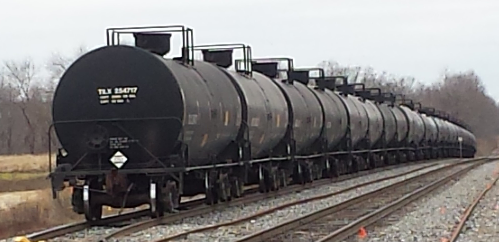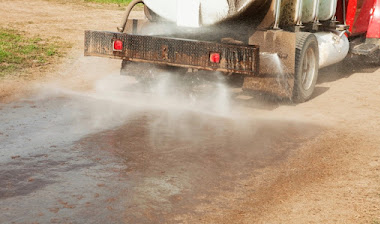
Stop LNG by Rail
March 22, 2022
Radioactivity Levels Found Outside Ohio Oilfield Waste Facility Called ‘Excessive’
April 30, 2022Latest Penn State Report On Environmental Impact Of Road Dumping Drilling Wastewater Will Have ‘Immediate,’ ‘Large,’ ‘Intense’ Impact

By David E. Hess, PA Environment Digest Blog, April 26, 2002
For background on the hazards of dumping toxic drilling wastewater on roads in PA read: The Science Says: Spreading Conventional Drilling Wastewater On Dirt & Gravel Roads Can Harm Aquatic Life, Poses Health Risks To Humans – And It Damages The Roads.
On April 25, Kurt Klapkowski, Acting DEP Deputy Secretary for Oil and Gas Management, told the DEP Oil and Gas Technical Advisory Board Penn State’s latest study on the environmental impact of road dumping conventional oil and gas wastewater will have an “immediate,” “large” and “intense” impact on the use of this material in Pennsylvania, nationally and possibly internationally.
DEP has had Penn State’s study under view since December 30 when it was submitted to the agency by Dr. William Burgos and his team. A revised report was submitted to DEP on or about April 11.
“There’s nobody that wants this released more than me,” said Klapkowski. “I think it’s important enough that it has to be a priority for us.”
“I was likening it to like a 20 pound stone being thrown into a pond, right? The ripples that are gonna come off this are gonna be immediate, and large,” said Klapkowski. “You know inside Pennsylvania, frankly I think nationally, this study has great interest. I don’t know if internationally, but possibly internationally, especially if other provinces allowed the use of this material, or other countries. I think people are gonna be looking at this study and saying this is what Penn State found on this, and this is important.”
“The attention is gonna be immediate and intense.”
Not Allowed Under Oil & Gas Regulations, But They Still Can
Klapkowski explained road dumping is “not allowed under our [Oil & Gas Regulations], and we don’t have any plans to allow it under our regulations, as far as I’m aware of, as of this date.”
He pointed out there are a number of entities “moving through the co-product determination process in DEP’s Waste Management Program that allows road dumping under the Residual Waste Regulations.
But, so far none of those entities have met the requirements of DEP’s Residual Waste co-product determination process.
As noted previously in PA Environment Digest, any conventional oil and gas operator now spreading drilling wastewater is doing so illegally. Read more here.
The latest oil and gas waste reports filed with DEP bring the total amount of reported conventional drilling wastewater illegally road dumped to nearly 2.9 million gallons from 2018 to 2021. Read more here.
Eyewitnesses report indiscriminate road dumping of conventional oil and gas wastewater continues in 2022.
While road dumping typically occurs on dirt and gravel roads, there were reports again last week of road dumping occurring on State Route 6 in Warren County and other paved roads on a clear day.
Operators who say it is not happening are simply wrong.
On April 21, a consultant for conventional oil and gas operators on DCED’s PA Grade Crude [Oil] Development Advisory Council reported the state Office of Attorney General is investigating the illegal disposal of conventional drilling wastewater through road dumping under DEP’s Residual Waste Regulations. Read more here.



